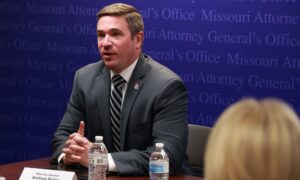9:00
News Story
Year-round school is out at three KC-area schools, but another says it’s boosting test scores
The North Kansas City School District and Gordon Parks charter school have turned away from year-round school, while Hickman Mills recently introduced it
When Natalie Brooks moved her daughters into North Kansas City Schools, she didn’t realize her neighborhood school was one of two in the district that put kids in class an extra 31 days.
She became an advocate of the program, believing it helped to skip long summer breaks where her daughters might forget what they’d learned at Crestview Elementary.
“I bragged about it for years,” she said, to “every single parent that crossed my path.”
So Brooks was “completely livid and upset” when she got a surprise email saying that Crestview would take summers off after the 2024-25 school year.
The theory of year-round school had seemed sound, and initial results were positive.
Other schools saw it, too.
In the Hickman Mills School District, test scores rose after the district moved an elementary school to year-round classes.
Charter school Gordon Parks Elementary credits its two years on an extended calendar with helping it catch up after the COVID-19 pandemic.
But the model also comes with pitfalls. For starters, it costs more. It also added to teacher burnout and faced attendance problems.
And after an encouraging start, NKC Schools saw achievement plunge at its year-round schools, accompanied by high teacher and student turnover.
In October, the school board voted to phase out the program. NKC declined an interview with The Beacon.
Parent Kyle Dennis said he’s not set on keeping the extended school year — though he originally moved to the district because of it — if someone could show him a better alternative.
But he’s not convinced the other ideas the district has floated, including teacher retention strategies, summer school and more coaching for teachers, will fix the “cratering” achievement the district described.
Some of the ideas aren’t specific yet. Others, like summer school, are similar to extending the school year but with less consistency and lower enrollment.
“I just want there to be a better option,” Dennis said. “How are you going to abandon year-round (school) and then go, ‘Oh, we’re going to do July summer school.’? It’s the same thing, except worse.”
The plan for year-round school
The idea was simple.
Students who spent more time in school would learn more and avoid the “summer slide” followed by time rehashing what they’d forgotten over break.
Parents would appreciate the extra education for their kids and the free summer child care.
Teachers would pursue the opportunity to earn a higher salary. Experienced teachers, in particular, would eye bigger pay bumps and the boost a raise would give to their retirement.
The district had tested a longer school year for students who didn’t speak English at home, said Kent Yocum, at the time instructional coach in the North Kansas City district. He was involved with that program and wrote his doctoral thesis about its success.
In mid-2015, NKC Schools expanded the program to all students at two of its lowest-performing elementary schools, Crestview and Winnwood.
The reality of year-round school
At first, that expanded program seemed to succeed, too.
A 2019 report found mixed results, said Donna Ginther, a professor of economics and director of the Institute for Policy and Social Research at the University of Kansas, who worked on the report.
Compared to similar NKC students, her research found, the year-round kids saw gains in math scores for some grades and improved English scores for one group of students.
“It wasn’t a silver bullet,” Ginther said. “The program helped, but I don’t think it was ever going to close the achievement gap.”
Ginther said she’d like to see students go through the program for a longer period, and without the interruption of the COVID-19 pandemic, to truly study its success.
The district continued the program. But academic achievement started to sink back below state averages, Deputy Superintendent Chad Sutton said during an October 2023 presentation to the school board.
Other signs hinted that the program hadn’t gone as planned.
District leaders had anticipated students who attended year-round school for six years getting the equivalent of an extra year of education. But many students didn’t experience that.
In spring 2023, a little more than three dozen Winnwood and Crestview fifth graders had attended the same school since kindergarten.
Winnwood was about to be merged with another elementary school.
More families moved to other schools. Attendance was lower in the summer, partly because Missouri didn’t legally require summer attendance.
Teachers were also leaving, with a five-year average turnover rate of 24% in one school, district spokesperson Susan Hiland said. The longer school year may have contributed to burnout.
Ginther, the researcher, said high teacher turnover could undermine the positive impact of a longer school year.
Community response
NKC Schools should have spent less time looking at numbers and more time talking to families, Brooks said.
She didn’t know the district had discussed ending the schedule until the decision was announced.
Dennis, at the time Parent Teacher Association vice president for Crestview, said he got a few days’ notice at a sparsely attended PTA meeting. He got the impression that it was too late to influence the recommendation.
The board presentation implied the district had consulted parents more than it actually had, Dennis said. He said surveys he received weren’t specifically about the school calendar.
While year-round school has been in place, parents have had the chance to give feedback through various surveys, Hiland wrote. She didn’t name any specific outreach to Crestview before the decision was announced.
After the decision, administrators collected feedback through parent and staff meetings.
A Jan. 9 parent meeting at Crestview went forward even though school was snowed out that day and the following day, Dennis said.
“We were literally there because we could be in four-wheel drive vehicles,” he said. “It was a small group of people, and that was one of our points of frustration.”
Brooks attended that meeting, hoping NKC Schools would backtrack, or at least give parents a chance to vote on year-round school.
She now believes that was never on the table, and said the district wasted her time and cost her money she would have earned for her family picking up Lyft fares.
“I feel like my voice (doesn’t) matter because it hasn’t changed for any of them to say, ‘I’m sorry. We apologize. We’re going to keep the extended school year,’” she said.
The future
A task force of NKC teachers, administrators and two parents met in March to discuss backup plans for helping students.
Hiland said the district plans for an expanded, more diverse task force, including more parents and staff from additional schools. The group will review feedback and finalize recommendations for the board to approve in the fall.
Without a convincing backup plan, Dennis sees the district withdrawing one form of support from a struggling school and replacing it with weaker alternatives.
District leaders have admitted summer school isn’t adequate, Dennis said, including in a meeting recording he shared with The Beacon.
Dennis said year-round school is different in that students have the same teachers and classmates, attendance is higher and it always takes place in the student’s normal school.
But he said that even with year-round school, the district pulled back on some support during the summer. Meals are worse, staffing is lower and new technology isn’t issued.
“That whole idea that there’s a distinction between summer school and year-round (school). Of course there is,” he said. But “they’ve been treating year-round like it’s summer school.”
Results at Hickman Mills
In southern Kansas City, Ingels Elementary in the Hickman Mills district is starting its second year of year-round school.
Superintendent Yaw Obeng said he needed a strategy to turn around lagging test scores.
He replaced the principal and hired teachers interested in the school’s schedule and philosophy.
The school now has a “World of Work” theme focusing on careers. Obeng said the longer school year allows more time for field trips and guest speakers.
Test scores are up, year-round students outperform their peers who arrived after the summer, and teacher retention has improved, Obeng said.
Year-round school costs more. Obeng hopes Missouri might change the funding model, but so far, the benefits are worth the money.
“We’ve just got to lead and show that this is the way to go in education,” he said. “Let’s demonstrate, bring the data forward, bring the feedback, and then that’s how change is made.”
An experiment at Gordon Parks
Several years ago, Yocum brought his experience in North Kansas City to his new role as principal at Gordon Parks Elementary School.
Worried about pandemic learning loss, he and other school leaders decided to extend the school year.
CEO Kirsten Lipari-Braman said the charter school, which also revamped its curriculum, saw “tremendous academic growth” during those years.
Teachers usually spend the first few months acclimating kids and building relationships, she said. If you’re “getting a lot of that kind of nuts and bolts out of the way” in June and July, “you can really hit the floor running in August.”
“(But) sometimes you have to step back, and you have to rethink,” Lipari-Braman said. “Maybe we try it again a different way.”
Money posed one problem. Even during Gordon Parks’ short break between school years, some families sent kids to other summer schools. Due to a quirk of state law, those schools got all the state funding for those children, though they attended Gordon Parks most of the summer.
Another source of money, pandemic relief funding, was about to end.
Families were divided, and mostly neutral, on whether to continue the schedule. But teachers were burning out.
Yocum said the school is especially sensitive to retaining teachers because it’s small. He was surprised how little teachers were motivated by the extra pay. Instead, they were worried they couldn’t keep up the pace.
So this summer, kids and teachers are out of school.
Yocum, who recently took a job as a school improvement consultant with the Kansas City Regional Professional Development Center, said he thinks year-round school is still worthwhile.
“It really serves a purpose,” he said. “But now, if I was talking to somebody, I have some additional information that’s important in that decision-making process.”
He’d suggest they think about how to build in adequate breaks for teachers and warn them that state funding might be trickier than it appears.
In North Kansas City, Brooks said when she looks back on her own education in the 1990s, she feels robbed. She wonders if an extended school year would have helped.
“If I had that when I was a kid, I might be more successful,” she said. “But I didn’t get that. So I have to kind of live vicariously through my children and make sure …every child gets the extended school year.”
This article first appeared on Beacon: Kansas City and is republished here under a Creative Commons license.![]()
Our stories may be republished online or in print under Creative Commons license CC BY-NC-ND 4.0. We ask that you edit only for style or to shorten, provide proper attribution and link to our website. AP and Getty images may not be republished. Please see our republishing guidelines for use of any other photos and graphics.





